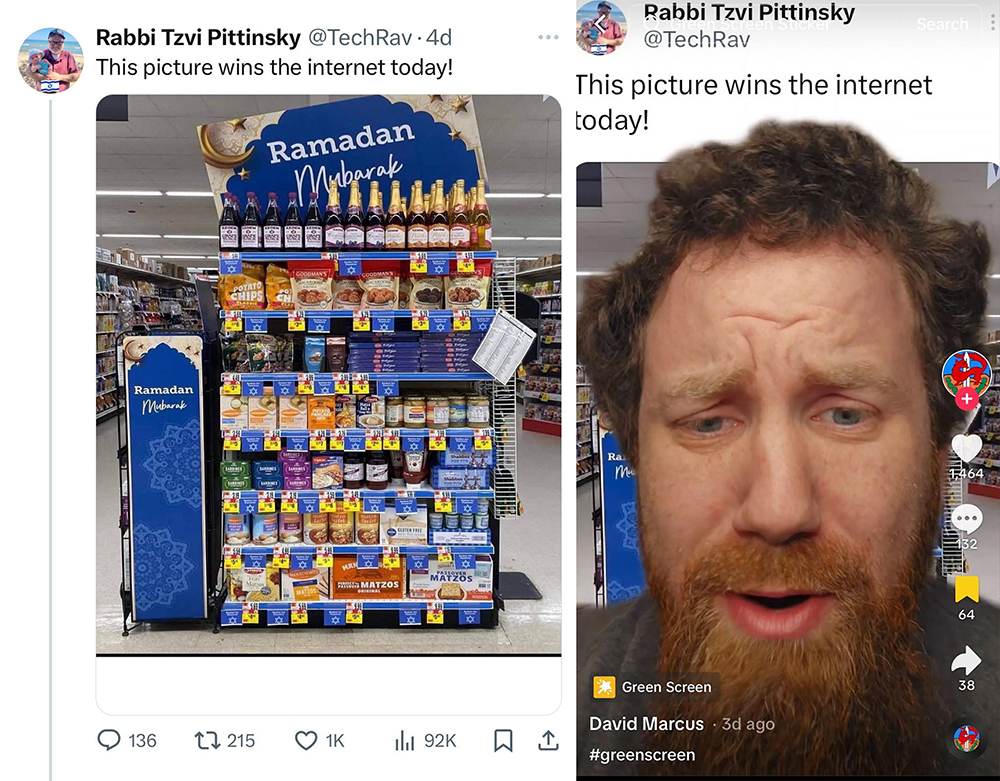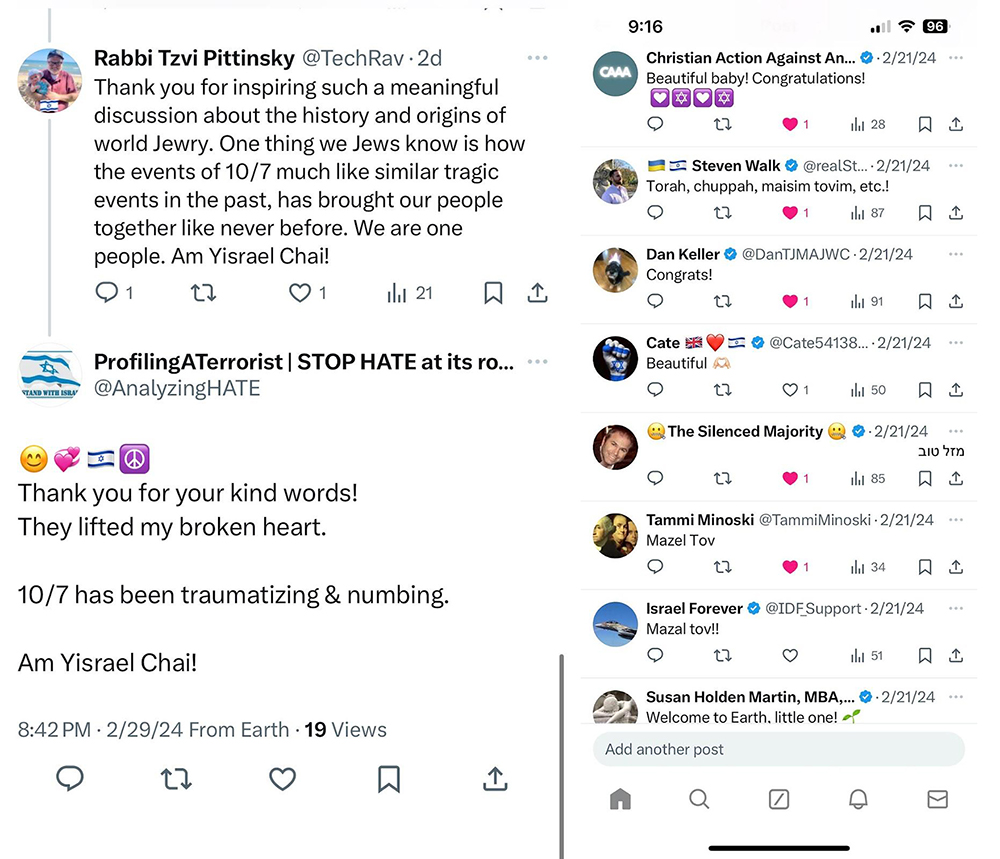
Last week, I saw a funny picture online which I decided to share to my X (formerly Twitter) feed with the caption, “This picture wins the internet today!” and it went viral. The picture was of a seasonal display in a supermarket for the upcoming Muslim holy month of Ramadan, only it included only kosher Jewish holiday items like grape juice, gefilte fish and matzah. You can see this supermarket fail in the photo.
This tweet has already received over 92,000 views, 1,000 likes, 215 retweets (when someone reshares your tweet onto their Twitter feed), and 136 comments. A day later, a friend WhatsApped me a TikTok video from someone I don’t know who shared my tweet, crediting me by name (only he mispronounced my last name as “Pittninksy”—no hard feelings). This TikTok has been seen by over 20,000 people. That’s over 112,000 views total.
Why do I share this besides to “brag” about my social media “prowess”? To illustrate the power of social media platforms like Twitter and TikTok to amplify your message in ways impossible just a few years ago, what noted technology thinker Clay Shirky calls “cognitive surplus.”
This can be a powerful force for spreading good and fighting the forces of evil in our trying times. Even the funny supermarket fail sparked a fascinating back and forth in the comments when one commenter chose to hijack the conversation with the antisemitic canard that Ashkenazic Jews are not “real Jews” and a different commenter chose to fight right back, correcting his misinformation.

Why is this important? Because the nature of Twitter and other social media platforms is that you are carrying on your conversation in public where many others can overhear. It’s like in the first “Rocky” movie when Rocky, who is dirt poor and doesn’t even own a phone, tells his girlfriend Adrian he will “call” her brother Paulie by screaming her brother’s name out the window into the street. When we are conversing on social media, we must always remember that we are not just having a conversation with one individual but, potentially, with thousands of others who can overhear. So at times, it can be worthwhile to engage in order to change the hearts and minds of those who are following.
I experienced this with a different tweet as well. This past week, I had a wonderful simcha in my family, the birth of a grandson. In addition to sharing this with my Facebook friends, I decided to share it with my Twitter followers as well, careful not to include any identifying information like the name of my daughter and son-in-law. And the tweet got over 2,400 likes and 340 comments, almost all congratulations from random people on the platform, both Jew and Gentile, who I do not know. You can see some of these below.
This is one more example of the ability of these social media platforms to share joy and good tidings, something we so sorely need in these trying times.
So how can we unlock the power of these platforms? Here are some pointers.
Find Your Platform
The main platforms that I am on are Facebook, Instagram and Twitter. (I only periodically use TikTok, a platform devoted to short form video with a very powerful algorithm and a controversial history of privacy concerns, so I won’t comment on it.)
I use Facebook to engage with people I know, my “friends,” although as any Facebook user knows, these usually include more than just friends but acquaintances as well. Facebook is also known for its groups, which are powerful platforms for conversing with like-minded people and Fan pages for following your favorite school, Jewish organization or publication like The Jewish Link (www.facebook.com/jlinknews). Some Facebook groups that I find worthwhile are Never Forget that Jewish Lives Matter (www.facebook.com/groups/333230335889597) for supporting Israel and Jewish unity throughout the world; Ask the Beit Midrash (www.facebook.com/groups/1665879967047991) for conversations about Jewish text; and שנים מקרא ואחד תרגו-מים (facebook.com/groups/617265112775175) for sharing parsha and Jewish holiday memes.
I use Instagram for sharing photos and stories. This is a favorite among our teens and Gen Z. I follow Amar’e Stoudemire (www.instagram.com/amareisreal) the former NBA player and proud Jew who recently posted a video of his speech when the Phoenix Suns retired his jersey, #32, (tinyurl.com/amare32) in which he expresses how his number stands for the Hebrew word לב meaning heart since he always played with his heart. I also follow Jewish Breaking News (www.instagram.com/jewishbreakingnews) for news out of Israel and the Jewish world; and Simcha Spot (www.instagram.com/simchaspot) for the latest happy announcements in our Jewish community.
Finally, I engage on Twitter. Twitter, now known as X, is a more text based medium than Facebook or Instagram. Some people I follow on Twitter are the amazing Hillel Fuld (twitter.com/hilzfuld), a Jewish tech influencer turned Israel champion who has done an incredible job these past four months in fighting antisemitism online; Eylon Levy (twitter.com/eylonalevy), an Israeli government spokesperson who has also been incredible; and Aviva Klompas (twitter.com/avivaklompas), who has been at the forefront of sharing often heart wrenching news from Israel.
Engage by Sharing Jokes, News and Inspiration
My goal is to use my social media to help fight the war against the haters and most importantly to turn those who might be on the fence or ignorant about Israel and the Jewish people. I am most active on Twitter since as a medium which is public by default, it is ideal for engaging in the public square. I find that I have many fruitful conversations on Twitter. Sometimes, I like to think, to change hearts and minds. It’s also a fun place for sharing jokes and funny memes with the world known as “Jewish Twitter.”
Respond Thoughtfully to Misinformation and Hate Speech
You can choose to engage with the anti-Israel and anti-Jewish commenters, like the Twitter user did in the example I profiled earlier. Even if you will not change the mind of the hater, speaking up could make a difference for the many spectators lurking online.
Amplify Others
Even if you are uncomfortable personally engaging directly, you can find a voice on social media by sharing or retweeting messages of others.
Report and Block
Engaging online is a balancing act. Users who are truly online “trolls,” who purposely make antagonizing statements like randomly commenting with a Palestinian flag on a Jewish post or posting hateful comments which I will not repeat here, should not be engaged with. When I find an online troll, I block and report them. I am not sure what this does for the world, but I know it makes my social media experience more civil and pleasant.
So please mindfully share your Jewish jokes, happy announcements, inspiring pictures and news online. And engage with others to correct the disinformation and outright Jewish hatred rampant in our world. Do your part to fight the forces of evil and spread light even in the dark corners of the web.
Rabbi Tzvi Pittinsky is the director of educational technology at Yeshivat Frisch. He can be reached at tzvi.pittinsky@frisch.org.











